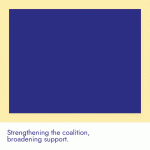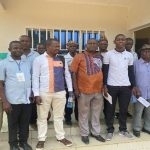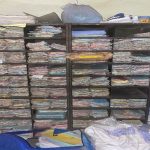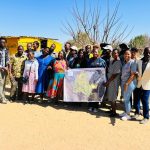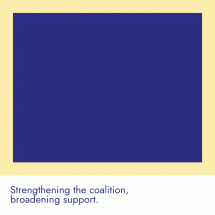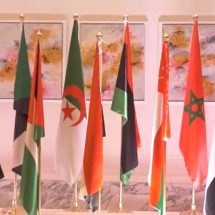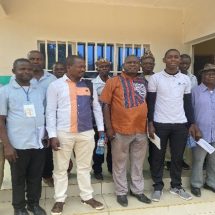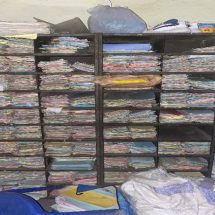Joint action plans developed for strengthening land tenure security by IFAD supported programmes in ESA region
The Land and Natural Resources Tenure Security Learning Initiative for Eastern and Southern Africa (TSLI-ESA), a regional project of UN-Habitat/GLTN IFAD successfully hosted a land tenure tools knowledge sharing workshop on the 26th of May, 2017 as a post-event of the IFAD ESA Regional Implementation Workshop at Speke Resort, Munyonyo, Kampala.
The workshop was attended by 74 participants (47 male and 27 female) who were mostly from 19 IFAD supported projects and programmes in 11 countries in ESA region. These included 19 coordinators and 30 technical staff and 5 farmer representatives of the beneficiary communities of IFAD supported projects/programmes, 5 GLTN partners supporting tool implementation and delivery of the regional training and learning events. The workshop was graced by high level representation from the Ministry of Land, Housing and Urban Development (MLHUD) Uganda and Ministry of Agriculture, Animal Industry and Fisheries (MAAIF), Uganda.
Ms. Naome Kabanda, the Assistant Commissioner of Land Registration in the Ministry of Land, Housing and Urban Development (MLHUD), lauded development and use of GLTN land tools by partners in Uganda noting that the MLHUD with support from GLTN will be developing a national strategy for Fit for Purpose strategy. The strategy is expected to be used as the methodology to secure increased survey and documentation of Uganda’s rural lands from the current 20 percent in the cadastral system in view of the high level of the undocumented 80 percent.
Harold Liversage, a Senior Land Tenure Specialist at IFAD, emphasized the value that IFAD place on strengthening security of tenure among project participants in order to unlock sustainable improvement in the welfare of the rural poor. In this regard, he reiterated, the importance of IFAD collaboration with GLTN both at global and in ESA within the framework of TSLI-ESA.
Oumar Sylla, Leader of GLTN/UN Habitat, commended all the participants for accepting GLTN invitation to the workshop that was timely to reflect on the five years of TSLI-ESA implementation and chart the way forward building on the best practices and lessons learnt.
VODP II Manager Ms. Connie Masaba additionally noted that the event thematically bridged the land tenure questions that VODP grapples with in their day to day implementation of their programme within the target area of Kalangala.
Four substantive sessions were delivered in an interactive and participatory process. Solomon Mkumbwa, TSLI_EA Project Coordinator, presented an overview of the project’s achievements, lessons learnt and a proposed framework for future cooperation. This was followed by the Risk Mapping Session that enabled the participants to discuss how their thematically diverse projects are affected by various land tenure issues and various measures they take to address them. The Tool Sharing Session saw community representatives and substantive project staff leading the sharing of tool implementation experiences.
Four projects including the Sustainable Agricultural Production Project (Malawi), Vegetable Oil Development Programme (Uganda), Smallholder Commercialization Projects and Upper Tana Natural Resources Management Programme (Kenya) showcased their experiences of utilizing GLTN tools and their benefits addressing tenure security challenges in their respective projects.
Participants agreed to the following Action Points (AP) in the action planning session including:
AP 1: Formation of a reference group comprising of key staff of IFAD supported projects to champion tenure in IFAD-supported projects/programmes to review and operationalize the proposed ‘strategy for strengthening tenure in IFAD supported projects/programmes;
AP 2: GLTN to facilitate development and publication of a resource book “Strengthening Tenure in IFAD supported projects and programmes in ESA region – Best Practices and Lessons Learnt” based on TSLI-ESA papers produced and shared at various conferences;
AP 3: IFAD will use of the four projects (VODPII, UTaNRMP, SDCP and SAPP) as ‘innovation hubs’ for other projects in ESA on thematic areas, and entry points for policy dialogue with governments, parliaments and other decision makers for mainstreaming tenure in development projects in the countries;
AP 4: Tenure analysis and action plan for all other projects/programmes – based on the results of the session “Tenure risks mapping – a self-assessment”, each project agreed to:
- Proposed interventions that project/programme on tenure risks in its project area?
- What does the project/programme need to do to achieve it?
- How does the IFAD supported project/programme achieve their objectives?
- How will project/programme know it has succeeded?
- How would the project/programme like to partner with GLTN?
Making closing remarks on behalf of GLTN, Solomon Mkumbwa thanked all participants for their active participation in the Workshop, regardless of their long week in Kampala. He summarized the outcomes and action points of the workshop. Closing the workshop, Mr. Nelson Basaalidde, the General Manager, Kalangala Oil Palm Growers Trust thanked the participants for the enthusiasm displayed and the joint action plans developed. He called upon the core reference teams established to ensure the plans are stream lined within the shortest time possible to give way to implementation of the same.


